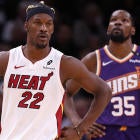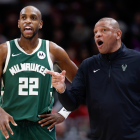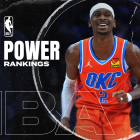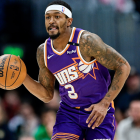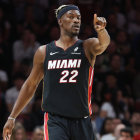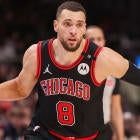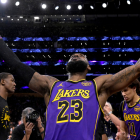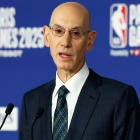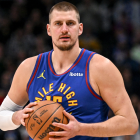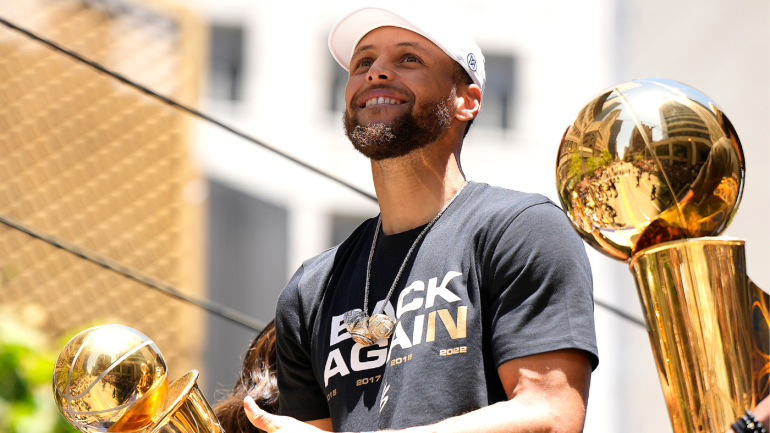
The NBA Draft is in the rearview mirror and free agency is set to open Thursday at 6 p.m. ET. Everything is about looking forward at this time of year. But me? I'm going to look backward for a minute. With time to digest, I've found myself thinking a lot about all the lessons we learned from this past postseason. These are the things that inform teams' decisions on draft night and throughout the free-agency period and trade season as they consider all manner of upgrades.
Here are five things we learned from the 2022 playoffs.
1. Steph Curry hasn't declined one bit
Perhaps I'm the only one who exaggerated Curry's decline. I'll admit, I did not think Curry was quite the same player anymore as I watched him go through the worst shooting season of his life. He was still great, obviously. But not quite the same. Or so I thought.
And then came the playoffs. He had a tough shooting series against Memphis, but he shot 40 percent from 3 against Denver and 43 percent in both the conference finals against Dallas and the Finals against Boston. More than the numbers, he was back to feeling like a bomb just waiting to explode. He was extraordinary inside the arc, diversifying his shot chart in a way he wasn't doing during extended rough regular-season stretches.
In the playoffs, Curry converted from inside the restricted area at a 69-percent clip. He made a career-playoff-high 53 percent of his shots from 3-10 feet, and from the deep midrange (16 feet to the 3-point line) he connected at a ridiculous 54 percent.
My contention is those rhythm midrange shots reestablished the deft paint touch that had been missing earlier in the season, and all those good feels transferred beyond the arc, where he connected at a 40-percent clip for the playoffs. Curry looked like his old shot-hunting self, needing just a sliver of space to detonate. He was properly arrogant. The great Mark Price once told me that even the best shooters can have their confidence shaken, and Curry was definitely pressing on his shot during the regular season. It wasn't quite as effortless and free-flowing as it became once again in the playoffs.
The struggles were a mirage. The greatest shooter to ever pick up a basketball is still a great shooter. Go figure, right? When Steve Kerr put him in pick-and-roll, and the Celtics decided to deploy drop coverage, he looked every bit like the superhero we've all come to know. Fact is, Curry might still be getting better, as crazy as that sounds.
Curry is at least as great, and again perhaps even greater, than he's ever been on the offensive end when you consider the variety of his destruction -- his gravitational pull, his unending commitment to off-ball movement, his otherworldly conditioning, his elite pound-for-pound strength which allows him to absorb contact on and off the ball, his three-level scoring, his pick-and-roll mastery despite his not getting a ton or reps in the action, his isolation prowess, and on and on I could go. And this is to say nothing of his defense, which is elite in a team scheme and legitimately good from an individual standpoint.
I truly thought the player that brought all of this to the table at an MVP level was fading away. I reasoned that everything that makes Curry an all-time great is built off his shooting, and as the regular-season shooting dipped considerably, I allowed myself to believe his overall impact would soon begin to reflect a similar downward trend. I was wrong. Curry still has a legitimate claim to the title of world's best player, or at least the player it's easiest to build a championship team around. All things considered, his best few years might honestly be ahead.
2. James Harden's decline is very real
Unlike Curry, Harden has definitely declined. At times the drop-off looks significant. Other times you can see the old superstar trying to break back out, enough so that you can talk yourself into the idea that with an offseason of rest, and if he commits to getting into great shape, he could maybe prove us all wrong next season.
But until then, he's not anywhere close to the same player. If he was, the Sixers would be giving him a max deal in the neighborhood of $47-48 million per year. But they're not going to give Harden that, and neither is anyone else. Rather, Harden is reportedly willing to accept an annual salary in the "mid-30s" according to ESPN's Brian Windhorst, which is still a pretty decent chunk of change but one that reflects his diminished value.
To me, we might not be giving Harden's decline enough consideration. There were plenty of stretches throughout the postseason where even the lower salary he's going to command would look like a massive overpay. I'm not going to say he can't get by guys anymore, but it's a tall order. Generally speaking, he needs a head of steam in semi-transition or off some kid of downhill action. Harden is not separating from defenders with nearly the same ease, which exacerbates his lack of vertical burst at the rim. When you're not getting space off the dribble and you can't explode as a finisher either, you're pretty bottled up.
To me, Harden needs to reincorporate his once-deadly floater. He only converted 25 percent of his shots in the 3-10-foot range in the playoffs. Without the same ability to get all the way to the rim and/or draw fouls, the crafty skill shots in the paint can potentially buoy his scoring, as can taking advantage of secondary creation opportunities off Tyrese Maxey's electric penetration when the defense is rotation.
But all of this is speculation. Again, with the evidence we have at the point in time, Harden is a significantly worse player than he's ever been throughout his prime. He averaged 18 points on 40.5 percent shooting in the playoffs. Forget making shots, there were times, plenty of them, when Harden couldn't even attempt shots.
When that's the case, he basically becomes almost entirely step-back dependent, and he's never been a good enough 3-point shooter to thrive solely on that. His 3-point shooting has always been part of an unpredictable package, one that had defenders virtually helpless trying to be close enough to contest step-backs while also somehow giving themselves room to react to Harden's penetration without fouling. It was a fool's errand. Old Harden had you on a string.
This, on the other hand, might just be old Harden.
3. Celtics are doing it right
After finishing two wins shy of an NBA championship, I've already heard local media in Boston starting in on Marcus Smart, who has seemingly spent the last half-decade on the trade block. Smart is awesome. So are the Celtics. They don't need any kind of dramatic change.
Could Smart take a little better care of the ball? Of course. Could he cut back on the impulsive, particularly early clock 3-pointers? Yes. But the Celtics' magical January turnaround linked up directly with Smart's inheritance of the offense. He might not be a star point guard, but like Smart said, the Celtics have done the All-Star point-guard thing with Isaiah Thomas, Kyrie Irving and Kemba Walker, and Smart is the only one who led them to the Finals.
This Boston team is all about the sum of its extremely versatile parts. Everyone can defend. Everyone can shoot. Everyone can put the ball on the floor. We'll continue to talk about this below, but every year the playoffs teach us more and more that you can't have weak links. Boston doesn't. From where I'm sitting, barring an absolute home-run trade, Boston only needs internal improvement. They have the parts to win it all.
Jayson Tatum needs to improve his finishing. Jaylen Brown needs to improve his ball-handling. The whole team needs to eliminate the stretches of offensive incoherence. But this is an awesome team. Make no mistake. They made great trades to bring in Derrick White and bring back Al Horford. The guts of this team is homegrown. They've gone to four conference finals in the last six years. Now they've made the Finals. This is how teams used to do it. Year by year until they get there. Boston is very close.
4. One-way players are dying
As mentioned above in the Celtics section, the importance of two-way players has never been higher in the NBA. Even one weak link, on either side of the ball, can be, and often is, a death sentence in today's game. The Warriors only get away with playing two non-shooters at once in Kevon Looney and Draymond Green because they have Steph Curry, who's worth about three great shooters in terms of space creation.
Still, Curry is a superstar because he plays both ends. You always hear about him being targeted defensively, and teams certainly try it, but it doesn't work all that well. He can defend. Plain and simple.
Trae Young, on the other hand, cannot. That's why the Hawks, as mentioned above, just traded for Dejounte Murray, to try to help cover for Young. But you can only cover for a defensive link as weak as Young to a degree. At a certain point, everyone has to pull their weight. Bad defenders are ruthless hunted. Chris Paul forced switches and demoralized Luka Doncic, who did the same Phoenix's smaller defenders on the other end.
The Celtics were in the Finals because everyone can shoot and everyone can defend. The Nets had to compromise one way or another with all their lineups, and they got swept in the first round. The Nuggets just traded Will Barton (and Monte Morris) for Kentavious Caldwell-Pope. Barton is a better scorer than KCP, but the latter impacts both ways. Denver now has greater access to two-way closing lineups.
The Blazers traded for Jerami Grant, but as currently constructed they're still going to have a heck of a time surviving in the playoffs -- if they make it that far in the first place -- covering for Damian Lillard and Anfernee Simons (who is one of the worst defenders in the league, by the way), the same way their ceiling was capped for so many years by the one-way backcourt of Lillard and CJ McCollum.
Kyle Lowry was terrible offensively for the Heat in the playoffs, but he stayed on the floor because he wasn't a defensive liability. Tyler Herro can get buckets, but had he been healthy it would've been very interesting to see whether Erik Spoelstra would've closed late conference-final games with him knowing he was going to be targeted. Victor Oladipo, an elite defender whose offense is better than Herro's defense, might've gotten the call.
The minute Gary Payton II came back into the fold for the Warriors vs. Boston, he jumped Jordan Poole in the rotation purely for defensive purposes. Poole is great when he's scoring, but when he's not, he can very quickly become unplayable in high-leverage moments.
Pat Riley said it best when discussing Herro's potential starting role next season, which surely also served as a message to Herro and his agents as he's up for a potential maximum rookie extension: "If you want to win a championship and you wanna be a starter, you really have to become a two-way player today."
5. Everyone needs a little luck
That doesn't mean the Warriors or any other team that wins it all didn't earn it. But luck is a factor. The Suns were the best team in the league all season and then they all got COVID. Chris Paul cannot catch a freaking break.
The Celtics are awesome, but they needed seven games to beat a Milwaukee team that was without Khris Middleton. Marcus Smart lost some games to injury as well, and he and Tatum were hurting even when they did play for the Celtics, but the bottom line is the Bucks were completely without an All-Star player in Middleton. In a seven-game series where the tiniest of factors can swing the tide, that's just old-fashioned bad luck.
The reverse was true last season. The Bucks, who eventually won it all, were a foot, literally, from being bounced in the second round by a Nets team that was forced to finish the series without Kyrie Irving and with James Harden gimping around like Keyser Soze.
The Sixers lost Joel Embiid, who was already playing with a torn thumb, to a broken face for the first two games of the conference semis against Miami, which had a 2-0 lead by the time Embiid returned. Miami might've gotten past Boston in the conference finals had Herro been healthy; the Heat struggled mightily to create in the half-court without him.
In 2015, the Cavs might've won it all had Irving and Kevin Love been available. In 2016, the Warriors likely finish their 73-win season with a championship if Draymond Green doesn't get suspended and Andrew Bogut doesn't get hurt. The Raptors likely don't have a title if Kevin Durant is healthy in 2019, or even, perhaps, if Klay Thompson doesn't blow his ACL in Game 6.
None of these things are excuses. They're just examples of the NBA reality. If you're not constructing your roster to account for these almost inevitable player absences, then you're basically praying for 100 percent health, which is bordering on a pipe dream (hello, Lakers); the likelihood of LeBron James and Anthony Davis staying healthy all regular season and through the playoffs, suffice it to say, isn't very high.
True, no team can lose a superstar the caliber of a LeBron James and still compete for, let alone win, a championship (unless you're the Durant-Curry Warriors, who were a cheat code), but depth and well-rounded rosters have never been more important. You have to factor less-than-ideal circumstances into your formula. NBA competition has never been deeper than it is right now. Close to half the league can make an argument that they're in the title discussion if things things break their way. That can be a pretty big if these days.
![[object Object] Logo](https://sportshub.cbsistatic.com/i/2020/04/22/e9ceb731-8b3f-4c60-98fe-090ab66a2997/screen-shot-2020-04-22-at-11-04-56-am.png)









